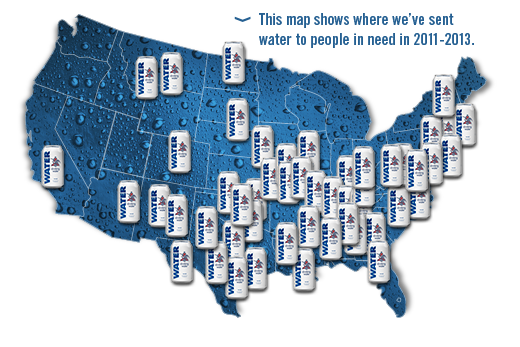Since the middle of May, following record-shattering rainfall across Texas and Oklahoma, both states are experiencing relentless, devastating flash flooding. With over 37 trillion gallons of rainfall in Texas alone, the entire region has been crippled by the natural disaster, which has left at least 23 people dead. In Houston, TX, the damages have already been estimated at a whopping $45 million.
In light of the staggering news coming out of the Southwest, Anheuser-Busch seized the opportunity to make a positive impact in its home country. Perhaps best known for being the parent of the Budweiser family of products, Anheuser-Busch is the largest brewery in the nation, with nearly a 50% market share of beer production in the U.S.
Late last month, Anheuser-Busch made a splash with the announcement that it would use its Cartersville, Georgia Brewery, one of twelve breweries in the country, to produce canned water. According to the brewery manager, Rob Hass, the plant temporarily halted beer production to produce an estimated 50,000 cans of water to ship to the affected region.
In a statement released by the company, Peter Kraemer, vice president of supply for Anheuser-Busch, explained “Relief workers and people in the region are in need of safe, clean drinking water, and Anheuser-Busch is in a unique position to produce and ship large quantities of emergency drinking water. Our local distributors help identify those communities most in need, and work with relief organizations such as the American Red Cross to make sure the water gets where it’s needed.”

The press release went on to note the company’s tradition of aiding disaster relief: they’ve donated more than 73 million cans of emergency drinking water since 1988 and have a century-old partnership with the Red Cross.
It’s heartwarming to see big corporations like Anheuser-Busch keep a focus on the humanity behind their products. Although Texas and Oklahoma are slowly embarking on a path to rebuild their communities, small, significant steps like the pledge to bring potable drinking water to the region will hopefully ease the region’s recovery.

